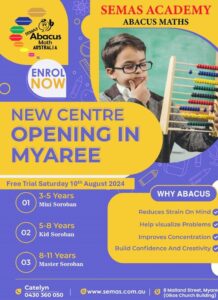<strong>Beyond Calculators: Why Abacus Education is Making a Comeback in Schools</strong>
In an era dominated by advanced technology and digital tools, the traditional abacus is experiencing a renaissance in schools worldwide. While calculators and computers have become ubiquitous in classrooms, educators are recognizing the enduring value of abacus education. This ancient tool, with its roots tracing back thousands of years, is proving to be a powerful method for developing strong mathematical foundations, cognitive skills, and problem-solving abilities in students. As educators embrace the abacus’s tactile and visual approach to arithmetic, students benefit from enhanced concentration, spatial awareness, and a deeper understanding of mathematical concepts. The abacus fosters a holistic learning experience that transcends the digital landscape.
The Resurgence of Abacus Education:
Amidst the digital revolution in education, the resurgence of abacus education is a testament to the enduring effectiveness of this time-tested method. Schools are reintegrating abacus training into their curriculum, acknowledging the unique benefits it offers to learners. Unlike calculators, which provide quick answers without much cognitive engagement, abacus education encourages students to develop a deep understanding of mathematical concepts and enhances their mental calculation abilities.
Building a Strong Foundation:
One of the primary reasons for the renewed interest in abacus education is its ability to lay a solid foundation in mathematics. The abacus is not just a calculating tool; it is a visual and tactile aid that helps students grasp abstract mathematical concepts. By physically manipulating beads on the abacus, learners develop a tangible understanding of numbers, place value, and arithmetic operations. This hands-on approach fosters a deeper comprehension of mathematical principles that extends beyond rote memorization. This method enhances problem-solving skills, boosts concentration, and cultivates a love for math. As students gain confidence in using the abacus, they build a strong mathematical mindset that benefits their overall academic performance.
Enhancing Cognitive Skills:
Abacus education goes beyond traditional math instruction by actively engaging cognitive processes. The constant manipulation of beads on the abacus requires concentration, fine motor skills, and hand-eye coordination. This multi-sensory experience stimulates different parts of the brain, contributing to improved memory, attention, and overall cognitive development. Research has shown that students who receive abacus training demonstrate enhanced problem-solving abilities and a more profound understanding of mathematical concepts compared to their peers who rely solely on calculators.
Cultivating Mental Math Prowess:
In an age where digital devices can perform complex calculations at lightning speed, the importance of mental math skills should not be underestimated. Abacus maths empowers students to perform calculations mentally with speed and accuracy. The mental math prowess acquired through abacus training enables students to solve problems quickly, boosting their confidence and proficiency in mathematical tasks. This skill is not only valuable in academic settings but also in real-world scenarios where mental agility is highly advantageous.
Nurturing a Love for Learning:
Abacus education fosters a positive and interactive learning environment. The tangible nature of the abacus makes learning math a dynamic and enjoyable experience. Students are actively involved in the learning process, which helps build a positive attitude towards mathematics. The sense of accomplishment derived from completing abacus exercises contributes to increased self-esteem and a genuine interest in learning. As students experience the joy of mastering mathematical concepts through the abacus, they are more likely to develop a lifelong love for learning.
Adapting to Individual Learning Styles:
One of the strengths of abacus education lies in its adaptability to various learning styles. Each student is unique, and the abacus provides a versatile tool that can be tailored to accommodate diverse learning preferences. Whether a student is a visual learner who benefits from seeing and manipulating the beads, an auditory learner who benefits from verbalizing the calculations, or a kinesthetic learner who benefits from the physical engagement with the abacus, this ancient tool caters to different modalities, ensuring that all students can benefit from the learning experience. Furthermore, the abacus fosters critical thinking and problem-solving skills by encouraging students to approach mathematical challenges in creative ways. Its simplicity and tactile nature engage learners, making math enjoyable and accessible to all, promoting a well-rounded education.
Cultural and Historical Significance:
Beyond its practical educational benefits, abacus education also carries cultural and historical significance. Originating in ancient civilizations such as Mesopotamia, China, and Greece, the abacus has a rich history that connects students with the roots of mathematics. Integrating abacus education into the curriculum provides an opportunity for students to appreciate the cultural diversity and historical evolution of mathematical tools. This broader perspective enhances their understanding of the subject and fosters a sense of appreciation for the contributions of different cultures to the development of mathematics, promoting improved focus and concentration.
Conclusion:
The resurgence of abacus education in schools signifies a shift towards a more holistic and comprehensive approach to mathematics instruction. Beyond calculators and digital tools, the abacus offers a unique and effective method for building strong foundations, enhancing cognitive skills, and cultivating a genuine love for learning math. As educators and parents recognize the enduring value of this ancient tool, its resurgence in schools is likely to continue, shaping a new generation of students who are not only proficient in mathematics but also possess the critical thinking and problem-solving skills necessary for success in the rapidly evolving world.






